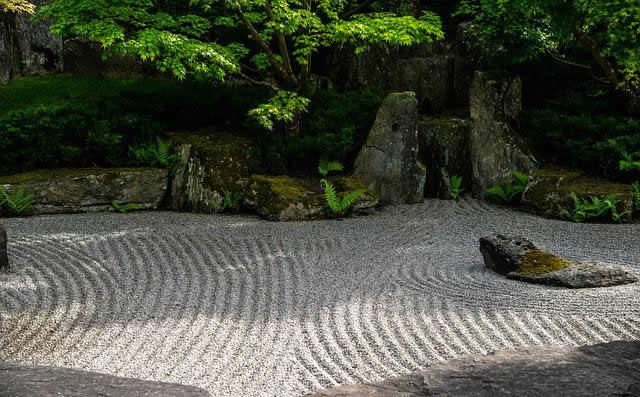先日から「The meaning behind the Japanese Zen garden -「日本の禅庭に込められた意味」を読んでいます。

・「日本の禅庭に込められた意味」(1)
・「日本の禅庭に込められた意味」(2)
・「日本の禅庭に込められた意味」(3)
・「日本の禅庭に込められた意味」(4)
・「日本の禅庭に込められた意味」(5)
・「日本の禅庭に込められた意味」(6)
・「日本の禅庭に込められた意味」(7)
Masuno believes Zen gardens – even a small one – can play a vital role in today’s cities, not only in brightening up the urban environment, but also in helping to “restore people’s humanity”.
枡野氏は、たとえ小さなものであっても、禅の庭は現代の都市において、都市環境を明るくするのみならず「人々の人間性を回復させる」という重要な役割を果たすと信じている。
For those who spend their days working inside buildings, bombarded by information and divorced from nature,
ビルの中で情報に振り回され、自然から切り離された日々を送る人たちに
garden spaces can help them find balance in their lives by “creating space, both physical and mental, for meditation and contemplation within the chaos of daily life,” writes Locher in Zen Garden Design.
禅の庭は「日常生活の混沌の中に、瞑想と思索のための物理的・精神的空間を作り出す」ことで、生活のバランスを取るのに役立つと、ロッチャーは『Zen Garden Design』で書いている。
Masuno sees 21st-Century life as being bound up in pursuing an abundance of things.
枡野氏は、21世紀の生活は、豊かさの追求に縛られていると考えている。
bound up in~「~に夢中で、深入りして」。
What is needed to counteract this obsession, he says, is “an abundance of spirit,” a chance for self-reflection and a connection with one’s inner self.
この強迫観念を打ち消すために必要なのは「豊かな心」であり、自分を見つめ直し、内面とつながる機会であると彼は語る。
counteract「~に逆らう、妨害する、(反作用で)中和する・打ち消す」。
確かに都市での生活って、お金がないと色々動かない部分が多くて(衣食住・娯楽等々)、快適な都市生活には物的豊かさ=経済力が必要・・・という考えを抱かせる場所だなあと思います。
でもそれは違う場所から眺めると、例えば田舎で暮らすと物的豊かさの追求は割と忘れられるというか、それらがなくてもそれなりに楽しく生きられる事が実感出来たりします。
都市生活の魅力はたくさんある、それはもちろんですが、そこを離れることで取り戻せる心身の平穏も、確かにあると思います。
理由は単純明快!「少ないコストでしっかり楽しく学べるから」。
私自身の経験(高機能でビックリ)をびっしり書いていますので、良かったら読んでみてください。
下のバナーからどうぞ!






